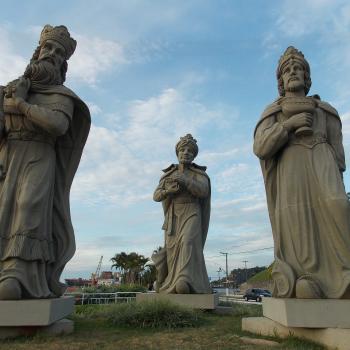Is the Son “inside” of God or “outside” of God?
This seems to be the heart of the question when we think of Arius’ solution, and those that followed his line of thinking. Arius and his ilk read the gospels and saw the Son sent for us, which is true. At what point, though, was he sent? In fact, at what point was he begotten?
Just using the word “point” makes the point. It’s as though Arius and his friends put their finger on the historical Jesus Christ and traced him back – back and back and back to his beginning, his beginning in the will of God who “begat” him in order to create and redeem us. The “only begotten Son.” For us. Pro nobis.
If this is the way we understand Trinity—as a singular God who, well, diversified himself for the sake of creation—then we are far afield from the grand understanding that orthodoxy urges us to embrace. Let’s see how it “reduces” God, or in some other way diminishes his mystery and glory.
The first problem we encounter is with the name “Father” for God. If in fact, God became a Father when he produced his only-begotten Son, then there is a reality to God that is before Father, a reality to him that is not essentially Father. The Fatherhood of God becomes tangential to his true identity, and so our relationship with him is actually based on some aspect of his character rather than his essence. He is something other than Father.
Second problem: When we worship Jesus, are we actually worshiping someone or something less than God? And we think God is okay with that? “I will not yield my glory to another…” (Is. 48.11).
Third problem: If the Son has been created and has his origin in the will of God, then the Son cannot fully know the heart of God—“he cannot possess comprehensive knowledge of the one God, nor indeed of himself.” If the Son falls on this side of creation, then he shares to some degree our fundamental ignorance and inability to know God. His entire ministry among us as the lived man, Jesus Christ, is shot through and through with possibility and probability, but not certainty, not revelation, and not salvation.
Fourth problem: If God needed to beget someone in order to create and redeem, and his own presence is too transcendent for us to bear, then we cannot really know him, and we most certainly cannot have a genuine relationship with him. We are two steps removed from knowing God, and he remains inaccessible, unknowable, unapproachable. We weren’t, then, made for relationship with him, and we cannot understand salvation as union with the heart of God.
If, as Anatolios writes, “the attribute ‘unbegotten’ becomes the crucial description of the divine essence,” then the Son does not belong in the Godhead. He may be super, preexistent, full of divine power, but he is a channel of God’s presence, not God’s presence himself.
What kind of God does that leave us?
We now have a God who is far away, watching us from a distance (Bette Midler was right!), relying on a super-creature to accomplish divine purposes. We have a God whose heart is only a Father’s heart in its posture toward us, but has never revealed to us the fuller dimension of who he is. We have a God whose “salvation” is referential rather than personal; whose instrument of creation and redemption is his “special assistant” but not his dear and eternal Son.
And we have a Savior whose knowledge of God is limited, partial, and select; we have a Savior who shares our distance from God and whose ministry among us is appointed rather than chosen; we have a Savior whose love for us is instrumental rather than immediate; and we have a Savior who is “contingent,” a being whose very existence is subject to the divine will, which comes to him from the outside. And really, what would be the point of the incarnation?
Is this it? Is this the God we worship? What are our options? How else can we understand the Trinity, creation, unbegottenness, begottenness?
Note to Reader: This series on Trinitarian Spirituality explores the history and spirituality behind the shaping of the Nicene Creed using Khaled Anatolios’ Retrieving Nicaea: The Development and Meaning of Trinitarian Doctrine (Grand Rapids, MI: Baker Academic, 2011) as guide and inspiration. It’s best to begin at the beginning: An Introduction.












